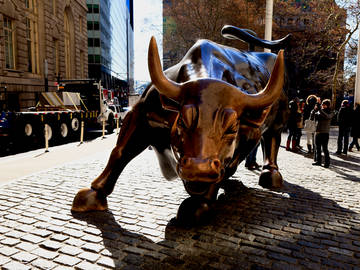In the jargon of stock-market traders, a bull is someone who buys securities or commodities in the expectation of a price rise, or someone whose actions make such a price rise happen. A bear is the opposite—someone who sells securities or commodities in expectation of a price decline. Certainly a majestic bull and a powerful bear present striking images, but how did these two come to be associated with stockbrokers?

The term 'bull' originally meant a speculative purchase in the expectation that stock prices would rise; the term was later applied to the person making such purchases.
The bear came first. Etymologists point to a proverb warning that it is not wise "to sell the bear's skin before one has caught the bear." By the eighteenth century, the term bearskin was being used in the phrase "to sell (or buy) the bearskin" and in the name "bearskin jobber," referring to one selling the "bearskin." Bearskin was quickly shortened to bear, which was applied to stock that was being sold by a speculator and the speculator selling stock.
I fear the word "bear" is hardly to be understood among the polite people; but I take the meaning to be, that one who ensures a real value upon an imaginary thing, is said to sell a "bear"....
—Richard Steele, The Tatler, 1709Thus every dissembler, every false friend, every secret cheat, every bear-skin jobber, has a cloven foot…
—Daniel Defoe, The Political History of the Devil, 1726
The bear sold a borrowed stock with a delivery date specified in the future. This was done with the expectation that stock prices would go down and the stock could be bought back at the lower price, with the difference from the selling price kept as profit. This type of selling was used by many people involved in an early eighteenth-century scandal in England known as the South Sea Bubble.
The South Sea Bubble gets its name from the South Sea Company, founded in 1711 to trade with Spain's colonies in the New World. South Sea stock became highly desirable when the king became governor of the company, and soon stockholders were enjoying returns of up to 100 percent. In 1720, the company assumed most of the British national debt and convinced its investors to give up state annuities for company stock, which was sold at a very high premium. Many of the speculators were selling stock they did not own, and when the stock price suddenly collapsed, the result was a debacle for the company and a tragedy for many investors. The term bear had been in use prior to the breaking of the South Sea Bubble; however, the affair brought bear into widespread use.
At about the same time, another animal symbol made its appearance in the marketplace. The term bull originally meant a speculative purchase in the expectation that stock prices would rise; the term was later applied to the person making such purchases. The animal seems to have been chosen as a fitting alter ego to the bear. Thus poet Alexander Pope wrote in 1720:
Come fill the South Sea goblet full;
The gods shall of our stock take care:
Europa pleased accepts the Bull,
And Jove with joy puts off the Bear.
This eighteenth-century animal imagery caught on, and bears and bulls have been in the stock market ever since.




